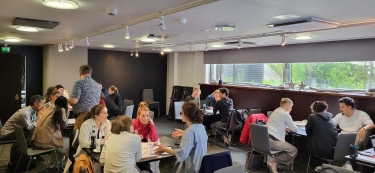Communication key to shaping public understanding of forest bioeconomy

Our ThinkForest webinar on 27 October focused on how the media, science and stakeholder groups shape the political and general public’s perceptions of forests and the forest bioeconomy.
Participants heard how trees are universally loved, and cause strong emotions in people. This appreciation has been heightened during the COVID lockdowns, with visitor numbers to forests and national parks increasing.
However, Tom Heap, BBC News Rural Affairs correspondent, pointed out that the narrative has changed from the haunted forests of the past to forests which are now haunted and disturbed by human actions. The public care hugely about forest loss in other countries, with fires in Siberia and Brazil hitting the headlines. This strong media narrative of “forests in peril” makes things difficult for productive forestry and the bioeconomy.
Both Christopher Raymond, an IPBES lead author, and Göran Berndes, an IPCC lead author reflected on the role scientists (and international science-based panels) also play in shaping public perceptions. We need transdisciplinary and action-oriented scientists who can help to set agendas, but there is the caveat that scientists come with their own particular background and values, and advocate for certain ways of investigating issues. This is often difficult to see for the public, with the impression given that the scientists just disagree.
Collaborating across disciplines is vital, and here panels like IPCC and IBPES can help to produce a coherent perspective, providing summaries for policymakers and soundbites for media which are underpinned with a huge amount of science. These can be quickly used and disseminated and lead to societal and political discussion. However, it is very difficult to reach out strongly with a message saying “it depends”, or on a complex issue like the bioeconomy.
The importance of communication was also highlighted from the policy maker perspective, when shaping policy agendas. Terhi Lehtonen, State Secretary for Climate and Environment in Finland, spoke about the recent actions the Finnish government has taken to combine different forest needs in policy. The collaboration of all stakeholders was of key importance, she pointed out. This was echoed by Maria Patek, from the Federal Ministry for Agriculture, Regions and Tourism, Austria, who said that communication with stakeholders (via the Austrian Forest Dialogue) was key to gain trust and enhance collaboration both inside and outside the sector.
Lea Ranacher from Wood K Plus presented the results of a new EFI metastudy, which reviews and summarises studies from the last decade to give a European-level perspective on public attitudes to forests and forest bioeconomy. The study team’s analysis showed that forest ecosystem services are highly valued, with environmental benefits seen as more important than social and economic ones. The public had a preference for forest protection and diversity. Although wood products are perceived as environmentally friendly, there is little awareness of new wood-based products, and in fact little known about consumer purchasing decisions.
From a stakeholder perspective, Silvia Melegari from CEI-Bois & EOS commented on the difficulty of showing the public the added value of forests. Many people are unaware that using forests generates income to forest owners, which is also used to maintain social and environmental benefits. Linde Zuidema from FERN commented that wood is seen as a sustainable raw material, but that the general public already understands that wood products are not necessarily sustainable products.
Summing up, ThinkForest President Janez Potočnik, reflected that effective communication is vital. The public is quite environmentally conscious, as can be seen from the EFI study, but acts and reacts intuitively due to a lack of information. A precondition for the bioeconomy to be acceptable for the public is that it is sustainable and contributing to sustainability efforts. This does not happen automatically – trust will be needed as well as explaining with science to the public and media.
More information
The ThinkForest webinar on Public Perception of Forests and Bioeconomy was held on 27 October.
View the programme and speakers
Download the study on Public perceptions of forestry and the forest-based bioeconomy in the European Union
Photo by ©lassedesignen - stock.adobe.com


